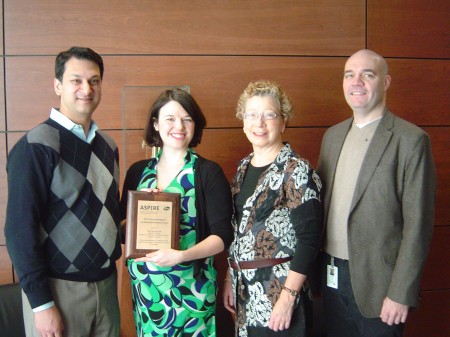Thank you for your interest but all positions are now full.
Category Archives: News
Undergraduate Internship from the Canadian Society of Immunology applications available.
See this link for the application.
The Bowdish lab will accept 1 NSERC Undergraduate Student Research award applicant and one Canadian Society of Immunology applicant for this year's thesis students. Please see FAQ page to determine if you are eligible to work in the Bowdish lab.
Now taking applications for summer students & thesis students
The Bowdish lab will accept 2 undergraduate students for work in the summer and subsequent thesis project. Please see the FAQ page for eligibility requirements.
Congratulations to Alicja Puchta on successfully passing her comprehensive exam!
December 8th, 2011
Alicja Puchta (MSc) is now officially a PhD candidate as she passed her comprehensive exam on “Macrophage generated responses to influenza virus with age”. Congratulations Alicja!
Dawn’s office has moved.
Dawn is now located on the 4th floor of MDCL in office MDCL-4020.
Michael Dorrington presents his work on pattern recognition receptors which recognize Streptococcus pneumoniae, November 2, 2011
Mike will be presenting at this week’s “Work in Progress” seminar. For details click kafka and dorrington-nov-2-11.
Fiona Whelan presents “Scavenging the Genome: The Evolution of the class A scavenger receptors” October, 19, 2011
Come see Fiona’s Work in Progress Seminar on her analysis of the evolution of the class A scavenger receptors and the implications this work has for redefining the definition of this family. For details click here cuddington and whelan-oct-19-1.
Dawn wins G. Jeanette Thorbecke Award from the Society of Leukocyte Biology.
The Thorbecke award was created by the SLB to honor G. Jeanette Thorbecke, M. D., Ph.D., and Professor of Pathology at the New York University School of Medicine, who tragically died in a swimming accident in November 2001. The award is intended for a deserving young female investigator working in the area of cellular and molecular mechanisms of host defense and inflammation.
As part of the award, Dawn will present recent work from the Bowdish lab at the 2011 SLB meeting in Kansas City, MO entitled “Age-Associated Changes in Monocyte/Macrophage Function Predispose the Elderly to Infectious Disease”, to be presented on Thursday September 22, 2011 at 4:45pm. In addition she will be giving a second talk at 5:15 Sept 23 in the “Hematopoiesis under Pressure” section.
Many prestigious early career scientists have received this award and Dawn is honoured to be counted among them. Dawn would like to express her thanks to all those who nominated her.
Click here for the article on the McMaster Daily News.
Dawn wins ASPIRE-Pfizer New Investigator Award
Dawn received the ASPIRE-Pfizer New Investigator Award for her work on understanding why the elderly are so susceptible to pneumonia. For more details see here.
Congratulations to Dr. Chris Verschoor on received the M.G. DeGroote Post-doctoral fellowship
Dr. Chris Verschoor has won the Micheal G. DeGroote Postdoctoral fellowship for 2011-2012. The prestigious Michael G. DeGroote Fellowship Awards provide postdoctoral candidates in the Faculty of Health Sciences the opportunity to pursue leading-edge health sciences research.The awards are designed for candidates who have an exemplary academic record and are interested in pursuing postdoctoral work in one of the numerous areas of research excellence in the Faculty of Health Sciences at McMaster University.
Dr. Verschoor won the award for his innovative project proposal on discovering the fundamental basis of susceptibility to pneumonia in the elderly. Pneumonia is a leading cause of death and decline of function in the elderly and a significant cost to the Canadian Health Care System. Dr. Verschoor proposes to discover the underlying molecular mechanisms of their increased susceptibility with a long term goal of discovering innovative therapies.


